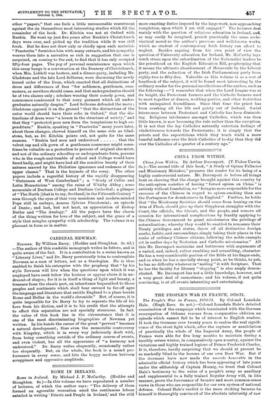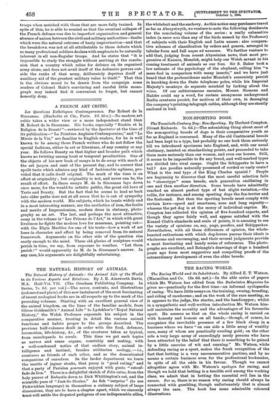The People's War in Prance, 1870 - 71. By Colonel Lonsdale Hale.
(Hugh Rees. Os. net.)—Colonel Lonsdale Hale's detailed examination of the campaign which terminated with the German reoccupation of Orleans rescues from comparative oblivion an episode which cannot fail to be of interest to English readers. It took the Germans over twenty years to realise the real signifi- cance of the stout fight which, after the capture or annihilation of practically the whole of the Imperial Army, the people of France were able for five long months to maintain during a terribly severe winter, in comparatively open country, against the victorious and highly trained legions of Prince Frederick Charles. It is, therefore, hardly surprising that we should at present be so markedly blind to the lessons of our own Boer War. But if the Germans have now made the amende honorable in the admirable official history which has been appearing of late years under the editorship of Captain Hoenig, we trust that Colonel Hale's testimony to the value of a people's army as auxiliary and supplemental to a fully trained Regular Army will, in like manner, prove the forerunner of broader and more common-sense views in those who are responsible for our own system of national defence. Colonel Hale's verdict is the more striking because he himself is thoroughly convinced of the absolute inferiority of raw
troops when matched with those that are more fully trained. In spite of this, he is able to remind us that the eventual collapse of the French defence was due to imperfect organisation and general absence of unison between the civil and military authorities—faults which were the natural outcome of hasty improvisation—and that the breakdown was not at all attributable to those defects which so many professional soldiers declare with emphasis to be naturally inherent in all non-Regular troops. And he states that "it is impossible to study the struggle without arriving at the conclu- sion that a country which relies for defence on its organised army alone, and does not avail itself of the defensive powers out- side the ranks of that army, deliberately deprives itself of auxiliary aid of the greatest military value to itself." That this is the obvious moral to be drawn from the campaign some readers of Colonel Hale's convincing and careful little mono- graph may indeed find it convenient to forget, but cannot honestly deny.























































 Previous page
Previous page